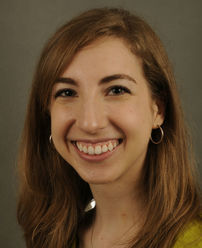 Andrea Kalchik
Andrea Kalchik
The key to improving human memory, Notre Dame psychology graduate student Andrea Kalchik believes, is understanding the circumstances that cause us to forget.
“Everyday forgetting is something that impacts everyone to some extent,” she said. “My research has the potential to help improve all people’s lives. I hope that I can make that difference.”
Kalchik, a Presidential University Fellow pursuing a Ph.D. in the Department of Psychology’s Cognition, Brain, and Behavior Area, is focusing her research on brain processes—metamemory, episodic future thinking, and prospective memory—that are essential components of human brain function.
Her current research project examines prospective memory—a person needing to remember to do something in the future, such as giving a birthday card to a friend the next time you see her.
Kalchik is implementing a fresh approach to analyzing prospective memory—using location as a cue.
Navigating a virtual shopping mall, subjects are given various tasks to perform, using the stores as cues to remember their assignments. The number of locations that tasks must be performed in and the number of sources assigning tasks varies between subjects.
“By doing this, it is my goal to understand more about how changing locations influences a person’s ability to successfully remember prospectively,” she said.
Her preliminary results suggest that location is an effective cue for prospective memory, but Kalchik said more work is needed to determine how her various manipulations are affecting the results.
Past Helping Future
Kalchik is also interested in studying metamemory—our awareness of what we are and are not able to remember.
“It’s what allows us to use our memories to guide future behaviors and decisions,” she said. “People can use metamemory to improve their general memory function in several ways, simply by making themselves more actively aware of the things they need to remember or recognizing what types of circumstances are likely to make it harder for them to remember.
“I’m interested in pinpointing more of those circumstances.”
She is also focused on learning about episodic future thinking—imagining experiencing a particular event in the future. A person preparing for a job interview, for example, uses episodic future thinking to imagine a conversation with the interviewer, drawing on past experiences to construct possible future scenarios.
“We need our memories to be able to think about our futures,” Kalchik said. “This is where the interplay between episodic future thinking and memory comes in.”
Guidance and Support
Her fascination with memory and forgetting began as an undergraduate at Ohio Northern University, thanks in large part to a cognitive psychology course and her work as a research assistant in a stress and memory lab.
At Notre Dame, Kalchik’s adviser is G.A. Radvansky, a professor of psychology who has played a vital role in her work.
“He pushes me to be better than my best, and he has given me many opportunities to do things beyond my degree requirements, including peer-reviewing two journal articles after doing a thorough literature review,” she said.
“He is always willing to meet and talk with me, and he provides detailed feedback on my work to help me learn, improve, and stand out.”
In addition to Radvansky’s guidance, Notre Dame has helped Kalchik advance her goals through its vast resources for graduate students. She is a winner of the National Science Foundation Graduate Research Fellowship and cites the “top-notch” workshops provided by The Graduate School’s Office of Grants and Fellowships, which helped her write her successful NSF application and equipped her to apply for additional grants and fellowships.
“I have always been able to find a good campus resource whenever I’ve had a question or needed help,” she said. “The Notre Dame community has been very supportive as I pursue my goals.”
Originally published by at al.nd.edu on January 18, 2016.